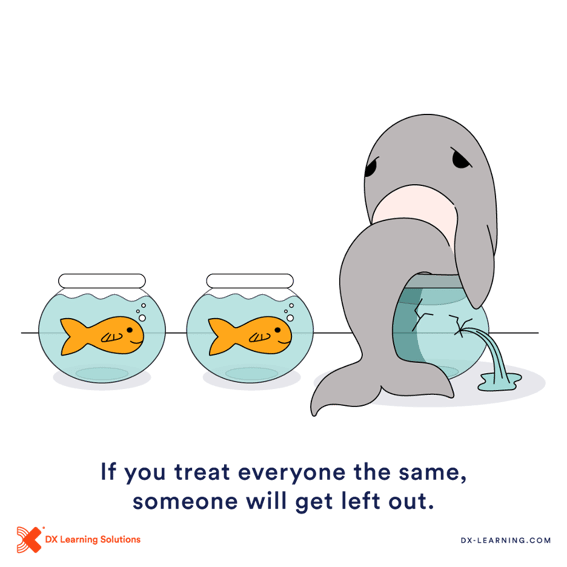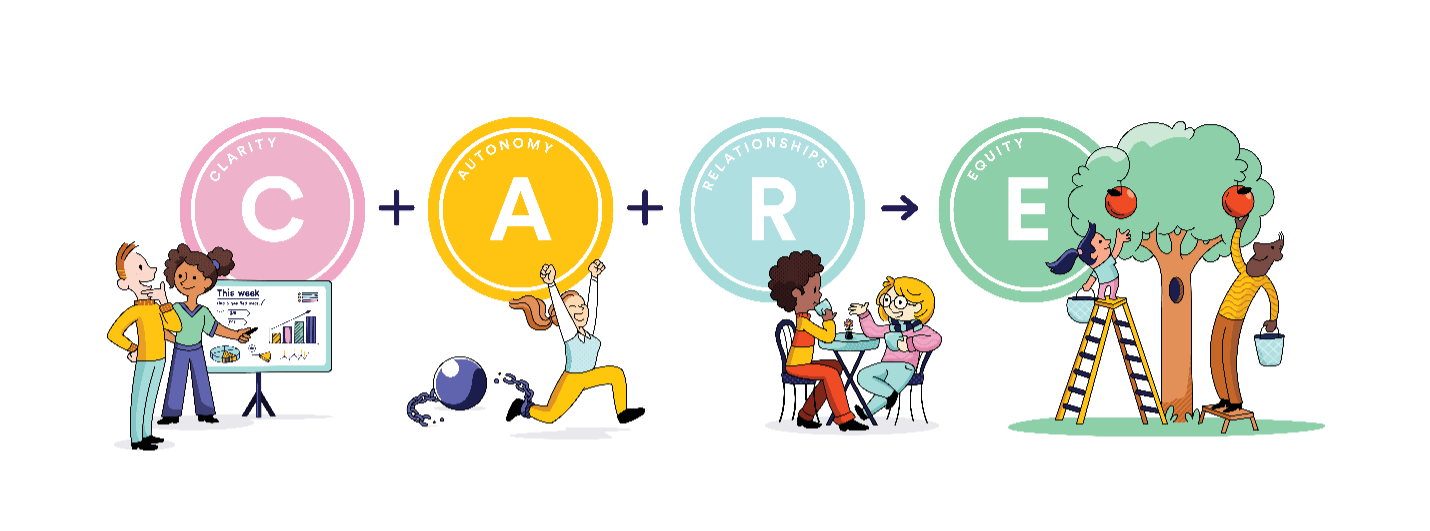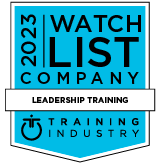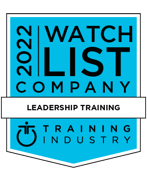The Key to Equitable Leadership: Interpersonal Relationships

As leaders, our primary goal is to guide our teams toward success. One key aspect of achieving this is recognizing that a one-size-fits-all leadership approach is not effective. It is what we call an equal approach where everyone gets the same thing.

This seems fair until you understand that each person on the team has different needs, which means that the same approach will yield different reactions and results. Instead, successful leaders tailor their strategies to the unique strengths and weaknesses of each team member. This individualized approach creates equity on a team, where fairness means individualizing and proportionately applying your resources in the way they are needed for each person.
This equitable leadership approach takes a lot of deliberate information gathering and strategic planning to execute effectively. Primarily, developing interpersonal relationships that help you gather the necessary information to take action and tailor your approach to the needs of your team.
Benefits of Building Strong Relationships

This undoubtedly takes a lot of time and effort which can be difficult if you are often in the weeds with your team, communicating goals and helping them figure out how to accomplish specific tasks. However, there are a host of benefits that will make this effort worth your while.
Leaders who commit to understanding the individual needs, strengths, weaknesses, preferences, and availability of their teams and follow through on this approach can enjoy a range of benefits and ultimately foster a more productive and positive work environment.
Here are some key advantages:
- Enhanced Team Performance: Tailoring leadership approaches based on individual strengths and weaknesses allows leaders to optimize team dynamics. By aligning tasks with team members' abilities, leaders can enhance overall performance and productivity and ensure that the team operates as more than its parts. It's like coaching a football team but taking the same approach with everyone. You aren’t going to win that way, and your team’s development will be scattered and unintentional. Play to your team’s strengths.
- Increased Employee Engagement: When team members feel that their leaders understand and value their unique contributions, they are more likely to be engaged and motivated. Recognizing individual needs and preferences creates a sense of purpose and satisfaction, contributing to a positive work environment. People who focus on using their strengths are six times as likely to be engaged in their jobs. People who receive feedback on their strengths have 7.8% greater productivity.
- Improved Job Satisfaction: Understanding and accommodating individual preferences can lead to increased job satisfaction. Team members are more likely to feel fulfilled and content when their work aligns with their interests, allowing them to make meaningful contributions to the team's goals. The psychological contract between employees and employers involves mutual expectations. When leaders understand and fulfill individual preferences, they contribute to a positive psychological contract. Research by Rousseau (1995) indicates that a positive psychological contract is linked to higher job satisfaction.
- Better Communication and Collaboration: Building strong relationships with team members fosters open communication and trust. Leaders who actively seek to understand their teams can create a collaborative atmosphere where ideas flow freely, and conflicts are resolved more effectively. Strong relationships contribute to effective conflict resolution within teams. A study by De Dreu and Weingart (2003) found that teams with high-quality relationships among members were better at resolving conflicts constructively. Open communication and trust are essential components of successful conflict resolution.
- Personalized Professional Development: Recognizing individual strengths and weaknesses enables leaders to tailor professional development opportunities for each team member. This personalized approach helps employees grow in areas where they need improvement and further excel in their areas of strength. Research by DeRue, Workman, and Morgeson (2010) emphasizes the value of individualized learning paths in professional development. Recognizing each team member's strengths and weaknesses enables leaders to customize training and developmental activities to address specific needs. This individualized approach contributes to more targeted skill development and improved performance.
- Retention of Talent: Employees are more likely to stay with an organization where their individual needs are acknowledged and their strengths are utilized effectively. This can lead to increased employee retention, saving the organization time and resources associated with recruiting and training new personnel. Talent management practices that focus on recognizing and developing individual strengths contribute to employee retention. A study by Scullion and Collings (2011) discusses the role of talent management in retaining key employees by aligning organizational and individual goals.
- Adaptability and Flexibility: Leaders who understand the availability and preferences of their team members can better accommodate flexible work arrangements. This adaptability promotes a healthier work-life balance, contributing to overall job satisfaction and well-being. Work-life balance is crucial for employee well-being. Research by Grönlund and Näswall (2013) emphasizes the impact of flexible work arrangements on work-life balance and psychological well-being. Leaders who acknowledge team members' preferences contribute to a healthier work-life balance, enhancing overall well-being.
- Positive Organizational Culture: Following through on an approach that recognizes individual needs contributes to a positive organizational culture. This positive culture, built on understanding and empathy, can attract top talent and enhance the organization's reputation both internally and externally. Employees' perceptions of organizational culture significantly impact their job satisfaction and commitment. A study by O'Reilly, Chatman, and Caldwell (1991) emphasizes the importance of a positive culture in shaping employee attitudes. Leaders who recognize individual needs contribute to a positive culture that attracts and retains top talent.
- Leadership Credibility: Leaders who consistently demonstrate a commitment to understanding and meeting individual needs build credibility within their teams. This credibility establishes trust and respect, making it easier for leaders to navigate challenges and lead with influence. The relationship between leadership credibility and trust is a well-explored concept. Research by Kouzes and Posner (2002) in their seminal work on leadership, "The Leadership Challenge," emphasizes the importance of credibility in building trust. Leaders who consistently demonstrate a commitment to understanding and meeting individual needs contribute to their credibility, fostering trust within their teams.
In summary, deliberately dedicating time to developing these relationships to build out a strategic leadership strategy based on the skills and needs of your team can save you time, unlock additional performance, and help you prepare your team for the future. Not to mention making them happier and more successful in their roles.
Now that we know what’s in it for you, let’s focus on how you can get there…
Understanding Individual Needs
To set our teams up for success, it's crucial to recognize that each team member is an individual with distinct needs. A leader's role extends beyond merely delegating tasks; it involves getting to know each team member on a personal level. By understanding their values, motivations, and work preferences, leaders can tailor their approach to better align with the individual needs of each team member. All humans are a little banana, but it's all about the effort in getting to know what makes each banana unique.

When an employee feels as though they are cared for as an individual, and their unique strengths and preferences are recognized, they tend to be more engaged in day-to-day operations and take on tasks outside of their job description. With a personalized plan that aims to bring out the best performance from each employee, suddenly the team can operate as more than the sum of its parts.
Here are several strategies leaders can employ to gain a deeper understanding of their teams:
- Regular One-on-One Meetings: By far, the best way to go about doing this is to schedule regular one-on-one meetings with each team member. Use this time to discuss their goals, challenges, and personal preferences. Encourage open communication and actively listen to their concerns and aspirations. These meetings provide a dedicated space for team members to express themselves.
- Employee Surveys and Feedback Sessions: Conduct surveys or feedback sessions to gather insights into team members' preferences and concerns. Anonymous surveys can be particularly useful for those who may hesitate to share their thoughts openly. Use the feedback received to make informed decisions about team dynamics and assignments.
- Performance Assessments: Regularly assess the performance of team members. Understand their strengths by recognizing outstanding achievements and areas where they excel. Simultaneously, identify weaknesses and areas for improvement. Constructive feedback during performance reviews can guide individuals toward professional growth.
- Strengths and Personality Assessments: Utilize strengths and personality assessments to gain a deeper understanding of team members' natural tendencies and characteristics. Tools like CliftonStrengths, DISC, and a host of other assessments, including our CARE instrument can provide valuable insights into communication styles, working preferences, and potential areas for development.
- Cross-Functional Training and Exposure: Provide opportunities for team members to gain exposure to different aspects of the organization. Cross-functional training not only broadens their skill sets but also allows leaders to identify hidden strengths and interests. This exposure can help in aligning team members with tasks that match their capabilities and aspirations.
- Team-Building Activities: Organize team-building activities that go beyond professional roles. Whether it's a social event or a collaborative project, such activities can reveal hidden talents, foster camaraderie, and provide leaders with valuable insights into the personalities and preferences of their team members.
- Lead by Example: Demonstrate openness and vulnerability as a leader. Share your own strengths and weaknesses to create an environment where team members feel comfortable doing the same. Leading by example encourages a culture of transparency and trust.
Conclusion
In the pursuit of leadership excellence, acknowledging the inadequacies of a one-size-fits-all approach is pivotal. Without a strong relationship to inform the leader of their team’s individual preferences, leaders are blind to their preferences. Leaders who invest in understanding individual team members and tailor strategies witness significant benefits, from improved performance and engagement to streamlined communication and a positive organizational culture.
The strategic advantages, including personalized professional development, greater innovation, and talent retention, underscore the long-term impact of this leadership approach. Although the commitment demands effort, the results—enhanced team dynamics and readiness for future challenges—make the investment worthwhile, contributing to both team happiness and success.
Armed with the understanding of these benefits, leaders can adopt practical strategies like regular one-on-one meetings, feedback sessions, and flexible work arrangements. Understanding individual needs not only drives team achievement but also fosters a collective and individual thriving that sets the stage for unparalleled success.

Leaders who CARE, win. Clarity, Autonomy, Relationships, and Equity®, the 4 human skills of higher performance.
In this article we focused on the interdependency between relationships and equity. For how clarity and autonomy work in unison, check this article out.
For more information on how you can CARE to Win, contact us. Read more here to find out how The Oncology Institute won through CARE.
Insights

Subscribe to Our Monthly Newsletter!
For managers and talent professionals who truly believe in putting people first, the CARE to Win blog is your gateway to the latest insights on human-centric leadership. Join us as we champion the people first movement.
Need some time apart? Are we emailing you too often? Just give us your feedback, and we promise we’ll respond. We really do care. And if it’s still too much, just unsubscribe. It’s cool.
 Ryan Aguiar
Ryan Aguiar


